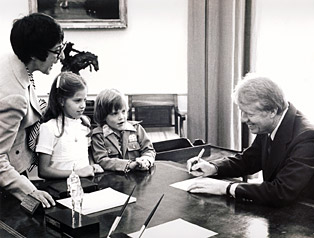Programs / Political Biography Project...
A biography of Midge’s political achievements and contributions is in progress, written by Doreen Mattingly of the San Diego State Women’s Studies Department. Fundraising efforts are underway to relieve Dr. Mattingly of fall courses, to complete the book project in 2010. Publication details below.
Book Proposal
Midge Costanza: A Political Life
Doreen Mattingly, Ph.D.
Despite her many contributions, little has been written about Midge Costanza. In the major histories of the Carter administration she is most often remembered for “public imbroglios,” her outrageous comments, and her demotion and ultimate resignation. She is even less visible in histories of the women’s movement, not even earning a mention in any of the major Women’s Studies texts on the subject. Indeed there are only two types of sources that discuss her contributions. She is featured in a handful of studies focused on Carter’s policies with respect to women and her meeting with the National Gay Task Force has garnered attention in histories of the lesbian and gay rights movement. While it is interesting to speculate on the reasons for this oversight, it is much more important to redress it.

As a professor of Women’s Studies and a close associate of Midge, Dr. Doreen Mattingly is uniquely well placed to write a book that will draw attention to Midge Costanza’s important contributions. Since co-teaching an SDSU class in 2004, Dr. Mattingly and Midge Costanza remained close. In January, 2009, Dr. Mattingly began sorting and archiving Midge’s many papers, using them to research and write about her political life. The book project is partially completed; theee chapters are in draft form and the documents are organized for the remaining chapters.
The proposed book will place Midge Costanza to her rightful place in the history of feminism, progressive politics, the Democratic Party, and the Presidency. The aim is to write a book written in a manner that will be accessible to the general educated public, which also includes extensive endnotes to provide scholarly legitimacy. It will not be a personal memoir but rather a political biography, illuminating the ways she contributed to, and was influenced by, the social movements and historical events of her time.
Outline for the book
- Chapter 1: The Road to the White House
- The daughter of Sicilian immigrants, Costanza started as a secretary in her native Rochester and worked her way up without the benefit of a college education or family ties. This chapter will draw on Costanza’s personal papers and writing, as well as interviews with Costanza and associates, to trace her rise to power.
- Chapter 2: Representing Women
- During the 1976 Presidential campaign, Costanza used her strong ties to the women’s movement to both win support for Carter and to advance the interests of women. This chapter will discuss Costanza’s role in Carter’s campaign and his early appointments, her complex ties to the National Women’s Political Caucus (NWPC) and other women’s groups, and the dynamics of “Washington Feminism” more generally. Often sidelined in discussions of second-wave feminism, feminist Washington insiders made significant contributions in the 1970s.
- Chapter 3: Gay Rights are Human Rights: Meeting with the NGTF (with Ashley Boyd and Cristina Dominguez)
- This chapter will examine Costanza’s meeting in March 1977 with leaders of the National Gay Task Force (NGTF), and the role the Executive Branch in the battle over gay rights. The meeting will be used to examine the emergence of the Christian Right and their growing disaffection with Carter.
- Chapter 4: Life isn’t Fair: The Hyde Amendment and the Limits of Loyalty
- In July 1977, Costanza was in the headlines again, this time for meeting with other senior women and men in the White House to draft a memo protesting a statement by Carter opposing federal funding for abortions and claiming that this was one area where “life is unfair.” Costanza’s opposition earned her the criticism of Carter loyalists. This event will be used to discuss the “insider/outsider” dilemma faced by activists in public office.
- Chapter 5: Ain’t I a Woman?: International Women’s Year and the Politics of Exclusion (with Jessica Nare)
- In November, 1977 2000 delegates and 18,000 spectators converged on Houston International Women’s Year (IWY) conference. Heralded as evidence of the success of feminism, anti-feminist women were largely excluded from state delegations and marginalized during the conference. As a result, the conference has become legendary for the anti-feminist movement. The IWY conference will be used to reflect on the relationship between feminist and anti-feminist movements.
- Chapter 6: Running out of Time: Extending the Ratification Deadline for the ERA
- Throughout her time in the White House, Midge Costanza played a role in the fight to ratify the Equal Right’s Amendment (ERA). The ERA extension battle provides a window into the declining influence of organized feminism and the appropriation of the discourse of women’s interests by the Christian Right. Rosalyn Carter and her role in the ERA battle and in battles over women’s issue more generally will be discussed.
- Chapter 7: Leaving the White House: Reorganization and Resignation
- The final chapter will discuss Costanza’s “reassignment,” her decision to resign from the White House altogether, and Carter’s continuing struggles with the feminist movement. Like many social progressives, Costanza supported Teddy Kennedy in his bid for the Democratic nomination in 1980. Costanza’s personal history will be used to illuminate the loss of support for Carter among the left, and the changing structure of the Democratic Party in general.
- Chapter 8: Hooray for Hollywood: Political Celebrity after the White House
- After leaving the White House, Costanza moved to Los Angeles where she became part of the Southern California progressive political community. She produced a talk show with Norma Lear, managed Shirley MacLaine’s “Higher Self” seminars, and worked on political campaigns. The final chapter will trace Midge's political and personal path after her decision to leave the White House